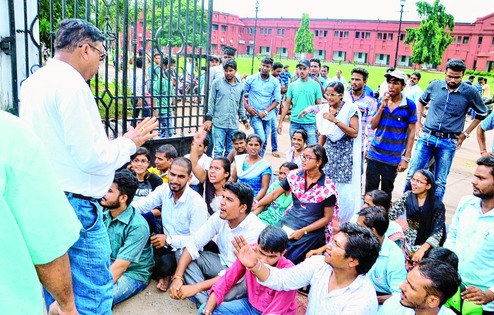
Cuttack, Aug. 22: Ravenshaw University's bid to adopt an alternative model of students' representation hit a roadblock today with the stalling of council elections. A combined front of students' organisations stalled the polls, forcing the varsity to defer it indefinitely.
The university's staff council had decided to make its maiden attempt to have indirect election of students' representation a two-day affair - August 22 and 23, and accordingly, a notice was issued yesterday.
Various students' organisations had given a combined strike call for two days as part of the movement against the varsity's bid to replace a single apex body with councils for each of the nine schools consisting of 34 departments.
The university authorities expected the students to attend class as usual during the two days and take part in the council elections during the time allotted for it.
But the strike call evoked a positive response with very low turnout of students to attend classes today. And for those, who turned up, it was not possible to go in because of the blockade that the combined front of students' organisations had put up.
"As no students or even teachers could come in, we decided to keep the students' council election in abeyance till further decision," council of deans chairman Gauranga Nanda told The Telegraph.
"The staff council will meet on Thursday to take a decision on future course of action," Nanda said.
The university had made elaborate arrangements to conduct the elections in between classes despite protracted agitations since it announced the alternative models. While 80-odd private security personnel had been deployed on the campus, around 200 policemen were present to ward off possible violence.
"There was very low turnout of students at the gate. Though they were prevented, no untoward incident occurred," said AnjanChittaranjan Mohanty Kumar Khuntia, university sports officer, who was in charge of security.
"We are opposed to the alternative model as doing away with direct elections amounts to murder of democratic rights of students and heritage of Ravenshaw University," said Saroj Mansingh, a postgraduate student.
"Adopting the students' council in the name of quality education is just a ploy to cover up administrative failure," said Arati Meher, an undergraduate student.
The combined front of students' organisations - those opposed to the alternative model - included the All India Democratic Students' Organisation, Akhila Bharat Vidyarthi Parishad, Biju Chhatra Janata Dal and the National Students' Union of India.
"We are happy that the students' organisations have made the strike a success and forced the university authorities to postpone the council elections indefinitely," said Chittaranjan Mohanty, president of Ravenshaw Bikash Abhijan (RBA), members of which constitutes of city based socio-political activists and former student leaders.
The RBA has been opposing the alternative model of students' representation as it allegedly gives a go by to the Supreme Court direction on students' union elections.
Vice-chancellor Prakash Chandra Sarangi said: "I have nothing more to say after what happened today. I had said what I wanted to say in my appeal yesterday."
Sarangi had made a fervent appeal to his colleagues and students "to join hands to implement the process of decentralised direct elections in order to rescue her from external conflicts".
In his appeal, the vice-chancellor had said: "The election issue is indeed a test of Ravenshaw's autonomy."
"Let us ask this question to ourselves: should Ravenshaw be managed by its acts and statutes or by outside elements?" the vice-chancellor had exhorted, while clarifying: "We are not against the students. They are getting the democratic space to dissent and to protest."
According to the alternative model notified on August 10, each of the undergraduate students (first, second and third year) and postgraduate (first and second year) courses of various departments will elect its representatives (one each for specific classes) directly through secret ballot at the department level. All the representatives will become members of the respective schools.
Students' council of each school will elect through secret ballot a convenor and deputy convenor from among its members.











